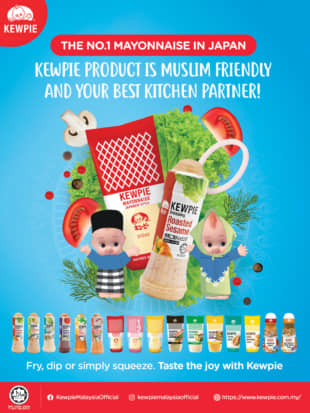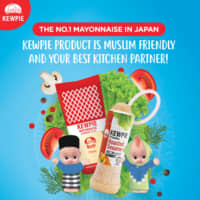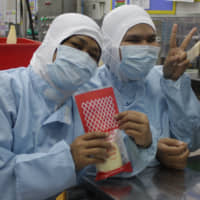Kewpie is well known in Japan for its mayonnaise, salad dressings and sauces. But a decade ago, the company embarked on a new and rewarding overseas challenge: the market for halal foods in Malaysia.

Malaysia Sdn. Bhd.
Certifying foods as halal, the Arabic word meaning “permissible,” is necessary for winning customers in countries with large Muslim populations such as Malaysia. Foods with the coveted halal mark mean Muslims can enjoy them knowing their ingredients have been prepared in accordance with Islamic principles governing ritual and cleanliness as outlined in the Quran.
Kewpie Malaysia Sdn. Bhd. was established in June 2009 as a “100 percent halal company” aimed at manufacturing and selling halal products with a focus on the Malaysian market, said Tatsuo Kabesu, its local managing director, in an email interview with The Japan Times.
The company noticed the increasing number of Muslim consumers globally was a potentially huge opportunity. “So we began to build the factory in Malaysia as the starting point for the halal market,” Kabesu said.
But as a foreign enterprise embarking on a new venture, there were plenty of issues to overcome.
“As Kewpie is a Japanese company, we started our halal business from zero and that was the biggest challenge (it faced),” said Kabesu, a 30-year veteran of Kewpie Group in Japan, China and Malaysia with core professional expertise in sales.
The most important task was ensuring that Kewpie closely followed the requirements of Malaysia’s halal regulator, the Department of Islamic Development Malaysia, for ingredient selection, product-manufacturing procedures, storage and other issues, he said.
But Kabesu added that Kewpie made additional efforts, such as hiring employees with specialization in halal and organizing meetings of its internal halal committee to ensure it always had the most up-to-date knowledge and followed correct procedures.

Being a Japanese company means Kewpie has had to work hard to overcome a lack of understanding that it is meeting important local standards.
“Hence, people might not recognize Kewpie Malaysia is a halal-certified food company,” he said. “Our product and brand awareness are still not so high, yet we always make our best efforts to spread halal awareness among Muslim consumers in Malaysia.”
Kewpie does that in various ways, including participation in halal food exhibitions, offering product samples to attract customers and disseminating marketing materials to inform them that its products are certified halal. Kewpie also provides cards and books with recipes for using its halal products.
A key part of the company’s corporate social responsibility (CSR) program is a sandwich-making class for elementary school children ages 7 to 12 that aims to teach healthy eating. Another example of the firm’s CSR activities is an offer of salad buffets at companies and factories with large numbers of Muslim employees.
Kabesu said that Kewpie’s most popular halal products are Roasted Sesame Dressing and Mayonnaise Japanese Style. Both items have also proven popular in many other markets.
“Malaysian food culture is modernizing rapidly,” Kabesu said, adding that Kewpie is doing its part to help the market develop and expand.
And while halal certification is an absolute necessity when marketing to Muslims, it has also proven an asset in attracting a wider array of consumers in Malaysia with its diverse ethnic groups.
“Non-Muslims also accept halal products because halal-certified products mean ‘clean’ and ‘safe,'” Kabesu said, adding that obtaining the imprimatur means passing strict testing. Thus, appealing to non-Muslim consumers via the halal mark is a “good business opportunity.”
Kewpie’s experience in Malaysia has also been helpful in expanding into other markets with large Muslim populations as the country’s halal certification is well accepted elsewhere, he commented. He added that knowledge Kewpie has gained in sales and marketing in Malaysia has been applicable in other Islamic countries, such as in food sampling and establishing good relationships with distributors and retailers.
“It gives us the potential opportunity to enter into such markets and reach out to more Muslim consumers globally,” Kabesu said.
In fact, Kewpie is also exporting to Singapore and has recently started shipping halal products to other Muslim countries, according to Kabesu.
All in all, Kewpie’s experience in Malaysia has been invaluable and Kabesu said it is “trying hard” to be the top food brand there.
“We have learned what the halal business is and are still learning,” he said. “Our products and brand awareness are steadily increasing. Creating a new food culture is difficult but exciting.”




